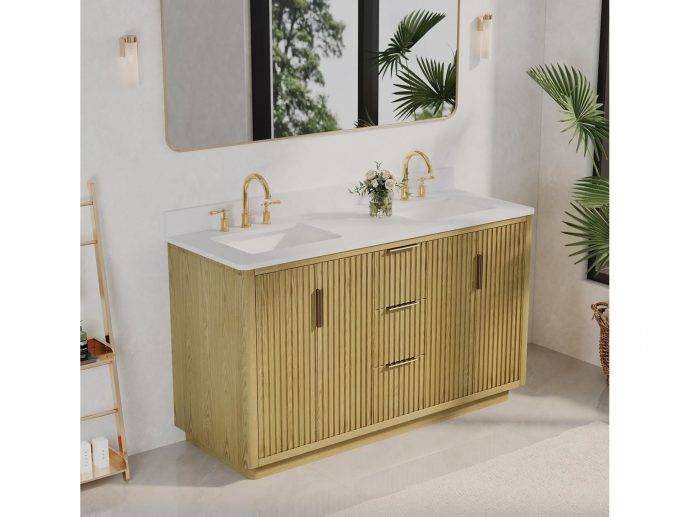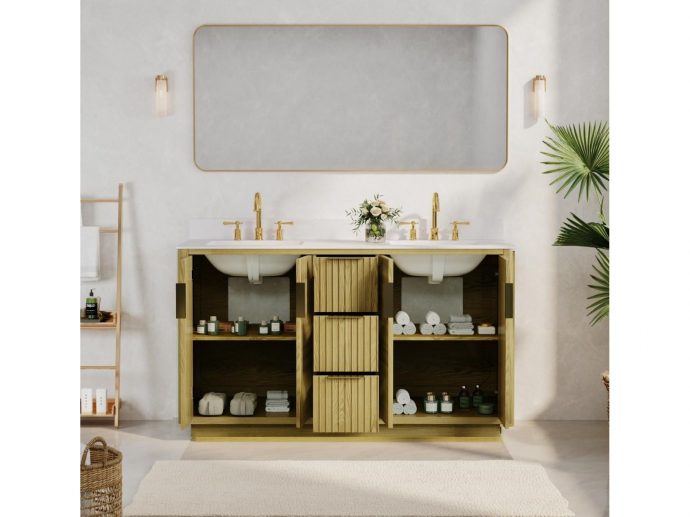Categories more
- Adventures (17)
- Arts / Collectables (15)
- Automotive (37)
- Aviation (11)
- Bath, Body, & Health (77)
- Children (6)
- Cigars / Spirits (32)
- Cuisine (16)
- Design/Architecture (22)
- Electronics (13)
- Entertainment (4)
- Event Planning (5)
- Fashion (46)
- Finance (9)
- Gifts / Misc (6)
- Home Decor (45)
- Jewelry (41)
- Pets (3)
- Philanthropy (1)
- Real Estate (16)
- Services (23)
- Sports / Golf (14)
- Vacation / Travel (60)
- Watches / Pens (15)
- Wines / Vines (24)
- Yachting / Boating (17)
Understanding Different Materials for Bathroom Vanities: Wood, Stone, and More
Published
08/27/2024Okay, let’s be honest—when was the last time you got excited about bathroom vanities? I mean, they're not exactly the star of the show like those dazzling tiles or fancy fixtures, but they’re pretty important. Imagine your bathroom without a vanity—yep, just a sink and a lot of awkwardly stored stuff. So, picking the right material for your vanity is kind of a big deal.
Let’s break it down. We’re talking about wood, stone, engineered stuff, glass, and metal. Each has its own vibe, pros, and quirks. Ready to find out which material matches your bathroom's personality? Let’s go!
Why Vanity Material Matters
Choosing the right vanity material isn’t just about looks—it’s about durability, maintenance, and how it fits into your bathroom’s grand scheme. You want something that’ll look great and stand up to daily use (because let’s face it, bathrooms can be tough places).
Wood: Timeless and Versatile
Wood vanities have this classic charm that never goes out of style. Whether you’re into oak, maple, walnut, or cherry, there’s a wood for you. Each type brings its own color and grain pattern, so you can totally customize the look.
Benefits of Wood Vanities:
- Natural Beauty: Wood adds warmth and character. It’s like bringing a bit of nature into your bathroom, which is perfect if you love a traditional or rustic look.
- Durability: A good quality wood vanity can last ages. Just keep it sealed to protect it from moisture.
- Customizability: Wood is like a blank canvas. You can stain, paint, or finish it to fit your style.
Considerations for Wood Vanities:
- Maintenance: Wood needs a bit of TLC. Regular sealing is essential to keep it from getting damaged by moisture.
- Cost: Solid wood can be pricier than some other materials. But hey, you’re paying for durability and style!
Stone: Luxurious and Durable
Stone vanities are the rock stars of bathroom design. Marble, granite, and quartz are the top contenders here, and they’re all about luxury and durability.
Benefits of Stone Vanities:
- Aesthetics: Stone adds a high-end, luxurious feel. Each piece is unique, so you’re getting something that stands out.
- Durability: It’s tough. Stone can handle a lot of wear and tear and won’t get bothered by heat.
- Low Maintenance: Quartz, in particular, is a breeze to clean. Just a quick wipe down and you’re good to go.
Considerations for Stone Vanities:
- Cost: Stone can be a bit of an investment. But if you’re going for a luxury look, it’s worth it.
- Weight: Stone is heavy. Make sure your bathroom can handle the load, or you might need some extra reinforcement.
- Porosity: Some stones, like marble, can stain if not properly sealed. Regular maintenance is key.
Engineered Wood and MDF: Budget-Friendly Alternatives
If solid wood feels like a bit too much for your budget, engineered wood and MDF are great alternatives. These materials are made from wood fibers mixed with resins or glues, creating a strong and cost-effective option.
Benefits of Engineered Wood and MDF Vanities:
- Affordability: Generally cheaper than solid wood. If you’re watching your wallet, this is a good choice.
- Stability: These materials are less likely to warp or crack in humid conditions, which makes them great for bathrooms.
- Variety: You can get finishes that look like wood, stone, or other materials, giving you tons of design options.
Considerations for Engineered Wood and MDF Vanities:
- Durability: Not quite as tough as solid wood. They can get damaged by water if not sealed properly.
- Aesthetics: The look can vary. Some might not have the same natural beauty as wood or stone.
Glass: Modern and Stylish
Glass vanities bring a sleek, modern touch to your bathroom. They can make your space feel more open and airy, which is perfect if you’re going for a contemporary look.
Benefits of Glass Vanities:
- Sleek Appearance: Glass adds a clean, polished look. It’s all about that modern vibe.
- Easy to Clean: Glass is non-porous, so it’s easy to wipe down. No pesky stains or mold.
- Moisture Resistant: Unlike wood, glass won’t warp or swell from humidity.
Considerations for Glass Vanities:
- Fragility: Glass can chip or crack, especially if you’re not careful. So, avoid heavy impacts.
- Maintenance: While easy to clean, glass can show water spots and fingerprints, so keep that glass cleaner handy.
- Cost: High-quality glass vanities can be on the pricey side, especially if they’re custom-made.
Metal: Industrial and Durable
Metal vanities are gaining traction for their industrial, modern look. Stainless steel and aluminum are popular choices for their durability and sleek appearance.
Benefits of Metal Vanities:
- Durability: Metal can take a beating. It’s resistant to water damage and tough enough for heavy use.
- Modern Aesthetics: Metal adds an edgy, industrial look that’s perfect for minimalist or modern bathrooms.
- Hygiene: Metal surfaces are easy to clean and don’t harbor bacteria.
Considerations for Metal Vanities:
- Cost: High-quality metal can be expensive. It’s an investment in durability and style.
- Temperature Sensitivity: Metal can be chilly to the touch, which might not be the most comfortable in colder climates.
Final Thoughts
Choosing the right material for your bathroom vanity is a big deal. Whether you’re drawn to the warmth of wood, the luxury of stone, the modern appeal of glass, or the durability of metal, each material brings something unique to the table. By understanding the pros and cons, you can pick a vanity that not only looks great but also fits perfectly into your lifestyle and budget.
So go ahead, pick the material that speaks to you, and create a bathroom that’s not just functional, but fabulous. Happy decorating!
















